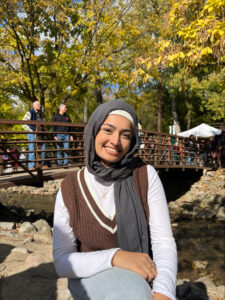Interview with Aasiyah Khan, graduating in May 2023

What attracted you to the WGS minor?
As a woman, I am aware of my own experiences and difficulties that I face because of it. However, I was interested to learn about how gender plays a role in our society on a systemic level; furthermore, reflecting on how it intersects with my identity as a Muslim Indian-American. My WGS minor classes allowed me to explore this and learn more about the impact of women and gender on our society.
What has been most interesting about your experience with the Program so far?
The most interesting experience I’ve had in the WGS Program is hearing the various ways people view gender and how these issues impact everyone differently. My favorite part of the program is getting the chance to hear these other perspectives, whether it be in my own classes or through WGS events such as the writing competition. Hearing other’s personal experiences with gender has opened my eyes to things I never thought about before.
Have you found any aspect of your WGS studies surprising?
An aspect of my WGS studies that was surprising was how many different areas I was able to explore gender through. The WGS minor offers classes from many departments which has allowed me to learn about how gender has influenced literature, psychology, and religion. I was able to think of these subjects in a new light and furthered my understanding of gender studies.
Has your work as a WGS minor impacted your other course work?
My work as a WGS minor has definitely impacted my other course work. Gender has influenced everything in our society even if we aren’t aware. For example, as a psychology major, I learn about a great deal of theories regarding human behavior. My WGS minor has impacted my psychology studies as I now analyze whether gender, sexuality, etc. has influenced these theories and studies. It was interesting to find out how any topic can be looked at within the lens of gender.
Have you seen any intersections between your work as a WGS minor and your experiences outside the classroom?
I have seen how my work as a WGS minor has intersected with my work in various student organizations. One example is through my presidency of Not My Fault, a sexual violence awareness group on campus. As a WGS minor, I have been able to learn about gender-based violence and have used that information to address this issue through advocacy and awareness. WGS has allowed me to expand my knowledge and use it to make an impact in the world.
Interview with Aasiyah Khan, graduating in May 2023 Read More »

